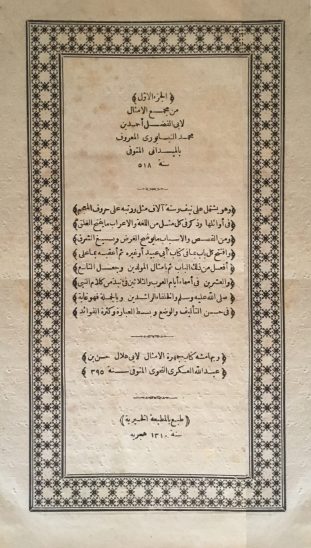Majma’ al-Amthal + Kitab Jamharat al-Amthal. TWO VOLUMES IN ONE. مجمع الأمثال + كتاب جمهرة الأمثال
Al-Maidani, abi al-Fadl & Abi Hilal Hassan B. ‘Abdallah al-’Askari.
Synopsis
“Proverbs excited the interest of the learned from the beginning of Arabic literature, historians and philologists emulated one another in collecting and explaining them. Thus we find among the sources of the works that have survived to us the old historians and genealogists like ‘Awna b. al-Hakam, and Abu–L-Yakzan to whom with the great monographist Muhammad b. Habib, Zubair b. Bakkar and al-Maidani we owe most of the history and legendary material. Majma’ al-Amthal is one of the oldest works which has survived, containing 4,766 proverbs. Al-Maidani collected the
material compiled by his predecessors in this work and expanded each section by an appendix on modern proverbs. Since then the work has been regarded as a standard work on the subject”. [Brill’s First Encyclopaedia of Islam, 1913-1936, Volume 5, p. 409].
The second text Jamharat al-‘Amthal was compiled by Abu Hilal al-Askari (d. 1005)and printed for the first time Bombay in 1306-07. It includes about 2000 mathal, arranged alphabetically according to the first letter. The author proceeds from Hamza’s work, whom he, being a purist, reproaches with having included too many “new ones”, and accumulates the material transmitted from his teachers, and their authorities in the madjalis; the
only quotation in the name of Abu ‘Ikrama is missing in the latter book; he had taken care to tighten the innumerable philological and “historical annotations”, rejecting amthal which were linguistically incorrect, occasionally distinguishing between al-mathal al kadim, al- muwald and al-muhadath. Al-Amthal in his collection are largely “literary ones” and have not in common any more with every day life in the streets”.
Bibliographic reference: The Encyclopaedia of Islam: fascicules 111-112, p. 823.






